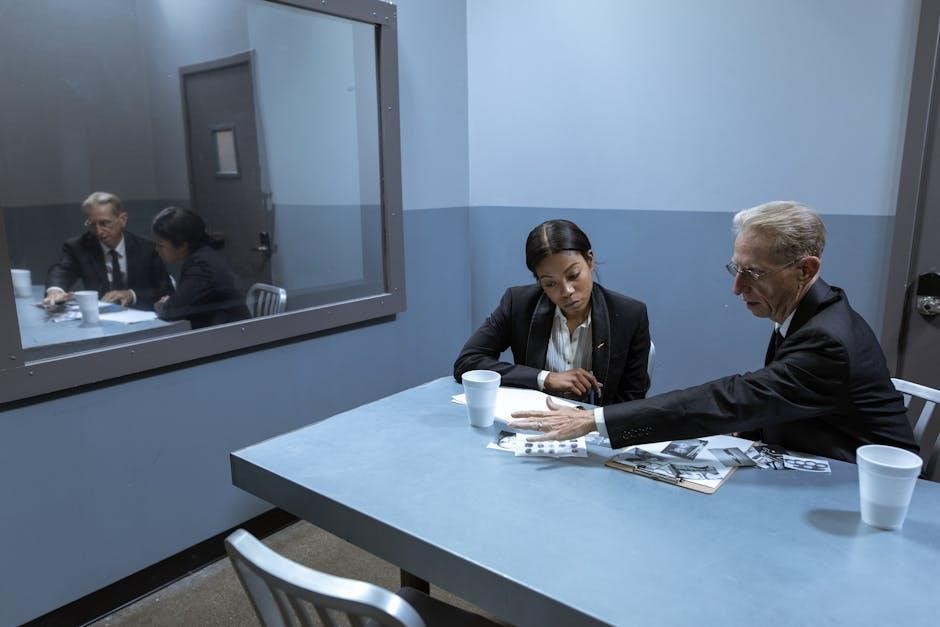Preparing for anesthesia interviews requires a comprehensive guide. This PDF offers expert answers, covering biographical, situational, and clinical questions, ensuring confidence and success in your interview.
Overview of the Importance of Preparation

Preparation is crucial for acing anesthesia interviews, as it demonstrates professionalism and readiness. Researching common questions and practicing responses helps build confidence. Understanding the types of questions—biographical, situational, and clinical—allows tailored preparation. Familiarizing yourself with anesthesia-specific scenarios and technical knowledge ensures you can address complex topics effectively. Mock interviews and feedback sessions refine your communication skills, essential for showcasing teamwork and problem-solving abilities. Utilizing PDF guides provides structured learning, covering essential topics like patient safety and emergency protocols. Adequate preparation not only highlights your expertise but also your commitment to delivering quality patient care, making you a standout candidate.
Structuring Your Knowledge for Success
Organizing your knowledge systematically is key to excelling in anesthesia interviews. Start by categorizing questions into biographical, situational, and clinical scenarios. Review technical aspects, such as pharmacology and physiology, to ensure a strong foundation. Practice explaining complex concepts clearly, using real-life examples to illustrate your experience. Prioritize understanding anesthesia protocols, emergency procedures, and patient safety guidelines. Develop a framework to discuss your decision-making process and problem-solving skills. Mock interviews can help refine your delivery, ensuring concise and confident responses. By structuring your knowledge effectively, you present yourself as a competent and well-prepared candidate, ready to handle diverse challenges in the field.
Common Types of Anesthesia Interview Questions
Anesthesia interviews typically include biographical, situational, and clinical scenario-based questions. These assess your experience, problem-solving skills, and ability to handle real-life medical challenges effectively.
Biographical Questions

Biographical questions in anesthesia interviews focus on your personal and professional background. These include inquiries about your education, training, and career choices. Be prepared to discuss your motivation for pursuing anesthesia, your medical school experiences, and any relevant fellowships or certifications. Employers are looking to understand your values, aspirations, and how your journey aligns with their organization’s goals. Additionally, you may be asked about your strengths, weaknesses, and long-term career objectives. Providing thoughtful, concise answers will help you make a strong impression and demonstrate your commitment to the field.
Situational and Operational Questions
Situational and operational questions in anesthesia interviews assess your practical experience and decision-making skills. These questions often involve hypothetical or real-life scenarios, such as managing emergencies, preparing patients for surgery, or handling unexpected complications. Employers aim to evaluate your ability to think critically and act effectively under pressure. For example, you might be asked how you would respond to an allergic reaction during anesthesia or how you ensure patient safety during an operation. Be prepared to provide specific examples from your experience and explain your problem-solving process. Demonstrating calmness, professionalism, and adherence to protocols will showcase your readiness for real-world challenges in anesthesia practice.
Clinical Scenario-Based Questions
Clinical scenario-based questions are a critical component of anesthesia interviews, designed to test your technical knowledge and ability to apply it in real-life situations. These questions often present complex patient cases, such as managing a difficult airway, handling cardiac complications, or addressing unexpected changes in vital signs. Interviewers seek to evaluate your diagnostic skills, understanding of anesthesia principles, and capacity to make swift, accurate decisions. Be prepared to walk through your thought process, including patient assessment, prioritization of care, and evidence-based interventions. Demonstrating a systematic approach and familiarity with current guidelines will highlight your expertise and readiness to handle high-stakes clinical scenarios effectively.

Sample Questions and Expert Answers
Sample questions and expert answers provide real-world insights, helping you understand how to articulate your knowledge and experiences effectively during interviews.
Technical Knowledge and Problem-Solving
Technical knowledge is critical in anesthesia interviews, as it assesses your understanding of pharmacology, physiology, and clinical procedures. Common questions focus on mechanisms of anesthetic drugs, complications of regional anesthesia, and crisis management. For example, you may be asked about the stages of anesthesia or the doses of muscle relaxants. Problem-solving scenarios, such as managing a difficult airway or anaphylaxis, test your ability to think critically under pressure. Expert answers demonstrate a clear understanding of principles and the ability to apply them in real-world situations. Practicing these types of questions ensures you can articulate your knowledge effectively and showcase your clinical competence.
Behavioral and Experiential Questions
Behavioral and experiential questions in anesthesia interviews focus on your past experiences and how you handle challenges. These questions assess your teamwork, communication, and decision-making skills. Examples include describing a time you collaborated with surgeons or managed an unexpected complication. Employers seek candidates who can reflect on their experiences, demonstrate learning from mistakes, and show adaptability. Structuring your answers with the STAR method (Situation, Task, Action, Result) helps provide clear and concise responses. Highlighting specific instances where you improved patient outcomes or enhanced team dynamics showcases your value as a candidate. These questions are your opportunity to illustrate how your experiences prepare you for the demands of the role.

Preparing for Stress and Tough Scenarios

Stressful scenarios in anesthesia interviews test your composure and problem-solving abilities. Practice high-pressure situations, such as managing emergencies or difficult patients, to build confidence and resilience.
Handling High-Pressure Situations
In anesthesia interviews, high-pressure scenarios are common. These questions assess your ability to remain calm and make quick decisions. Be prepared to discuss how you manage emergencies, prioritize tasks, and maintain focus under stress. Practice answering questions about critical incidents, such as unexpected patient reactions or equipment failures. Highlight your problem-solving skills and ability to communicate clearly during crises. Use the anesthesia interview questions and answers PDF to review examples and develop confident, concise responses. Demonstrating composure and effective decision-making will showcase your readiness for challenging situations in the operating room.
Demonstrating Teamwork and Communication Skills
Teamwork and communication are vital in anesthesia. Interviewers often ask about your ability to collaborate with surgeons, nurses, and other professionals. Prepare examples of how you’ve worked in teams, shared information clearly, and resolved conflicts. Highlight instances where effective communication improved patient outcomes. Use the anesthesia interview questions and answers PDF to find sample questions and answers that focus on these skills. Emphasize active listening, clear verbal and written communication, and your willingness to support colleagues. Showcasing these abilities will demonstrate your value as a team-oriented anesthesiologist, ready to contribute to a cohesive healthcare environment.

Final Tips and Resources
Download comprehensive anesthesia interview questions and answers PDF guides to prepare effectively. Practice with mock interviews and seek feedback to enhance your performance and confidence.
Downloading and Utilizing PDF Guides Effectively
Downloading anesthesia interview questions and answers PDF guides provides instant access to expert knowledge. These resources organize information clearly, covering biographical, situational, and clinical scenarios. Utilize them to identify gaps in your knowledge and focus on high-yield topics. Regularly review and practice answering questions to build confidence. Many guides include sample answers and tips, offering insights into interviewers’ expectations. Prioritize guides that include real-life examples and practical advice, ensuring you are well-prepared for various interview formats. By integrating these PDFs into your study routine, you can systematically improve your readiness and performance in anesthesia interviews.

Practicing with Mock Interviews and Feedback
Mock interviews are a powerful tool for refining your performance. Simulate real interview scenarios with colleagues or mentors to assess your communication skills and confidence. Focus on answering questions clearly and concisely, emphasizing your clinical experience and problem-solving abilities. Seek feedback to identify strengths and areas for improvement, such as body language or tone. Regular practice helps you become more comfortable with common question types, including biographical, situational, and clinical scenarios. Use feedback to refine your answers and develop a confident, professional demeanor. Over time, this process sharpens your ability to articulate your qualifications effectively, ensuring you are well-prepared for the actual interview.
